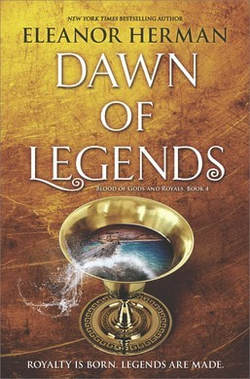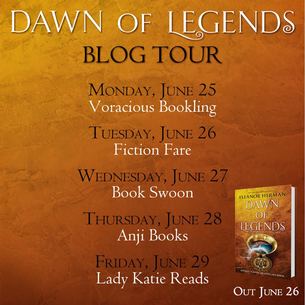
For those of you who don't know, the Blood of Gods and Royals series follows Alexander of Macedon in his teen years, depicting his journey of how he became "the Great." The books paint a beautiful world, and create a riveting plot with a fantastical twist, I highly recommend. If you're interested, I have reviews on all the previous books, so feel free to check them out to get more information. :)
Anyway, without further ado, here's what you all came here for-- a guest post from Eleanor Herman, the author of this fantastical series.
__
by Eleanor Herman
Four years ago, I got a four-book contract from Harlequin Teen for my YA Fantasy series, Blood of Gods and Royals, about the adventures of a teen Alexander the Great in the fourth century BC. It was an exciting project because Alexander was one of history’s most pivotal characters. The world was one way before his reign, and a very different way after. He opened a door between east and west, a door that hasn’t closed since.
Alexander opened up Europe to silk, spices, new ideas of government, science, medicine, religion, and architecture. Today’s blond, green-eyed Afghanis look the way they do because 2,300 years ago Alexander’s men chose to stay and colonize the area. Likewise, the east absorbed western culture, and Indian statues of Buddha suddenly started to look a lot like Apollo. Alexander was a brilliant, trailblazing meteor across the canvas of world history. So very bright, so very brief.
I chose to focus on Alexander as a teen because almost nothing is known about him at that age, a fact which aggravates the historian but offers the novelist fascinating possibilities. Based on everything written about him once he became king, I could extrapolate backwards, imagining who he was at sixteen—brilliant, ambitious, personable, and trying to find his footing in a world he would, in a few years, change forever.
In addition to the challenges of writing any YA Fantasy book—plot, character development, and how to weave in believable fantasy elements—this series presented me with a special challenge. I wanted Legacy of Kings, Empire of Dust, Reign of Serpents, and Dawn of Legends to elegantly drop the reader right smack into the middle of the ancient Greek world. Luckily I am a historian well-versed in how people lived in past centuries.
What factoids could I use to create the granular feel of an authentic past? Well, lighting for one. We take it for granted that light is everywhere present, and if the sun isn’t out, the world is still well lit by electricity. But when writing a historical novel, an author must always remember that the world was one of utter darkness when the sun went down and how the characters would have lit it.
In most ages, characters use candles for light, but not the ancient Greeks! They made use of their abundant olive oil for easy lighting. It’s hard to say when candles were invented, but they took a lot of time to make, and it was far easier dumping some oil into a lamp, putting in a little cloth wick, and lighting it. Oil lamps were even put in chandeliers and hoisted on a rope to provide light for a room.
Since matches weren’t invented until the 1830s, my characters had to light their lamps with flint and tinder sets, which must have been placed throughout the house: the exterior doors and next to their beds, for instance. In the pitch dark, they would strike a flint against a piece of iron or steel, and the resulting sparks would land in a pile of lint or dried grass, catch fire, and they would dip their candle or lamp wick into it. Light was also provided by resin-soaked torches set against stone walls and outside. And then there were cressets—iron baskets on top of long poles in the ground burning firewood. They cast a lot of light, but oh ye gods, were they hot.
In the era before light pollution, the moon provided ample light on a clear night, brightening and silvering the landscape. For all four books in the Blood of Gods and Royals series, I looked up the moon cycles in 340 BC and kept a record of the phases of the moon for every chapter. I asked myself, would it have been light enough to travel at night? Or dark enough to hide your movements from your enemies?
Another consideration was windows. While glass was around in the form of small perfume bottles and goblets, the ancient Greeks didn’t have glass window panes. They had slatted wooden shutters in their windows. On a cold winter’s day, they might crack them open for a bit of light, hoping the sliver would not let in much of the biting wind or driving rain.
In terms of heating, many historical novels mention fireplaces, but in the ancient Greek world that would have been an embarrassing anachronism. Until the Middle Ages, Europeans had fire pits in the center of a room with a smoke hole overhead (which let in cold air and rain.) They also had braziers, metal pans or boxes in which they burned wood or coal. They placed them near an open window to vent smoke (which let in cold air and rain.)
Another aspect of ancient life I had to consider was dirt and dung. Mentioning hygiene—or the lack thereof—gave my readers a strong whiff of a very different time. City streets would have been peppered with the droppings of horses, donkeys, and oxen, and my characters, when walking, would have had to step over it. As far as personal hygiene was concerned, Greeks were far cleaner than their medieval descendants, but soap hadn’t been invented yet. They scraped dirt off their skin with a metal tool called a strigil and rubbed in aromatic oils. Still, without deodorant there would have been body odor in the heat. And their hair must have been a greasy mess, though nicely combed, clipped, and pinned.
Another consideration for the historical accuracy of the novels was the lack of medical care. With no plastic surgery, warriors would have had unsightly battle scars. Everyone over the first bloom of youth would have had missing and cavity-ridden teeth.
There was one area where I reveled in combining historical truth with fantasy. The ancient world was rich with magic. People believed there could be a god on that mountain and a water nymph in that pond. It was not such a stretch to weave into the novels a Pegasus, evil bat-like Spirit Eaters that devoured the flesh of the gods and all other living things, a flying panther called a Hellion, and Snake Magic that gives its possessors the power to slip into the bodies of animals. To the ancient mind, this would all have made perfect sense.
In Dawn of Legends and its three predecessors, I endeavored to create a world of darkness aglow with oil lamps, scented with flowery oils and pungent blasts of body odor, and throughout it all, vibrant with magic.
Thanks,
Anj
Oh! And don't forget to visit Lady Katie Reads tomorrow for the last stop on the blog tour. :)





 RSS Feed
RSS Feed
